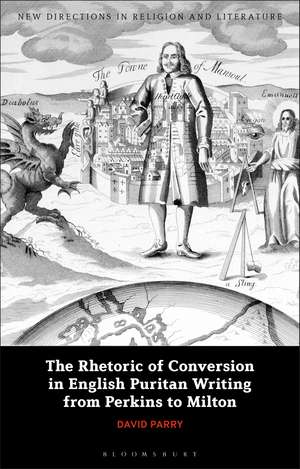The Rhetoric of Conversion in English Puritan Writing from Perkins to Milton: New Directions in Religion and Literature
Autor David Parryen Limba Engleză Paperback – 26 iul 2023
| Toate formatele și edițiile | Preț | Express |
|---|---|---|
| Paperback (1) | 192.55 lei 6-8 săpt. | |
| Bloomsbury Publishing – 26 iul 2023 | 192.55 lei 6-8 săpt. | |
| Hardback (1) | 540.89 lei 6-8 săpt. | |
| Bloomsbury Publishing – 26 ian 2022 | 540.89 lei 6-8 săpt. |
Din seria New Directions in Religion and Literature
-
 Preț: 192.27 lei
Preț: 192.27 lei - 30%
 Preț: 509.20 lei
Preț: 509.20 lei - 30%
 Preț: 509.86 lei
Preț: 509.86 lei - 30%
 Preț: 510.03 lei
Preț: 510.03 lei - 24%
 Preț: 195.56 lei
Preț: 195.56 lei -
 Preț: 176.86 lei
Preț: 176.86 lei - 21%
 Preț: 215.96 lei
Preț: 215.96 lei - 14%
 Preț: 175.91 lei
Preț: 175.91 lei - 30%
 Preț: 566.83 lei
Preț: 566.83 lei - 23%
 Preț: 190.87 lei
Preț: 190.87 lei - 21%
 Preț: 217.35 lei
Preț: 217.35 lei - 24%
 Preț: 195.37 lei
Preț: 195.37 lei - 23%
 Preț: 254.55 lei
Preț: 254.55 lei - 14%
 Preț: 176.44 lei
Preț: 176.44 lei - 24%
 Preț: 188.55 lei
Preț: 188.55 lei - 12%
 Preț: 215.88 lei
Preț: 215.88 lei - 14%
 Preț: 196.96 lei
Preț: 196.96 lei - 14%
 Preț: 183.70 lei
Preț: 183.70 lei - 23%
 Preț: 191.38 lei
Preț: 191.38 lei - 23%
 Preț: 254.02 lei
Preț: 254.02 lei - 14%
 Preț: 176.86 lei
Preț: 176.86 lei - 23%
 Preț: 254.55 lei
Preț: 254.55 lei - 14%
 Preț: 164.59 lei
Preț: 164.59 lei - 24%
 Preț: 190.33 lei
Preț: 190.33 lei - 13%
 Preț: 229.86 lei
Preț: 229.86 lei - 30%
 Preț: 508.95 lei
Preț: 508.95 lei - 30%
 Preț: 540.54 lei
Preț: 540.54 lei -
 Preț: 176.44 lei
Preț: 176.44 lei - 23%
 Preț: 235.00 lei
Preț: 235.00 lei
Preț: 192.55 lei
Preț vechi: 250.01 lei
-23% Nou
Puncte Express: 289
Preț estimativ în valută:
36.84€ • 38.47$ • 30.49£
36.84€ • 38.47$ • 30.49£
Carte tipărită la comandă
Livrare economică 04-18 aprilie
Preluare comenzi: 021 569.72.76
Specificații
ISBN-13: 9781350280625
ISBN-10: 1350280623
Pagini: 288
Ilustrații: 1 bw illus
Dimensiuni: 153 x 234 x 25 mm
Greutate: 0.4 kg
Editura: Bloomsbury Publishing
Colecția Bloomsbury Academic
Seria New Directions in Religion and Literature
Locul publicării:London, United Kingdom
ISBN-10: 1350280623
Pagini: 288
Ilustrații: 1 bw illus
Dimensiuni: 153 x 234 x 25 mm
Greutate: 0.4 kg
Editura: Bloomsbury Publishing
Colecția Bloomsbury Academic
Seria New Directions in Religion and Literature
Locul publicării:London, United Kingdom
Caracteristici
Unpacks how allegories such as Bunyan's The Pilgrim's Progress came to be among the most significant Puritan contributions to the English literary canon, despite their suspicions of allegory and imagination
Notă biografică
David Parry is a member of the Department of English and Film at the University of Exeter, UK.
Cuprins
Introduction: The Rhetoric of Conversion and the Conversion of RhetoricChapter 1: A Passionate Logos: The Persuasive Practical Divinity of William Perkins and Richard SibbesChapter 2: Divine Excess: The Ethos of the RadicalsChapter 3: Light and Weight: Richard Baxter's Exhortations and MeditationsChapter 4: Direction by Diversion: John Bunyan's Imaginative PersuasionChapter 5: 'By winning words to conquer willing hearts': John Milton's Redeemed RhetoricBibliographyIndex
Recenzii
Readable and engaging ... It will benefit a range of general readers interested in literature, church history, and theology. Most importantly, for those who have ears to hear, it will help in the ongoing rekindling of the fires of imagination that have always carried the church.
Rich, scholarly, and impressively wide-ranging.
Parry's study deals with complexities of Reformed and Calvinist theology in a highly readable way ... The book's careful explanation and measured exploration of intricate concepts and ideas mean that, it is likely to find a readership among those with an interest in methods and modes of preaching, as well as to seventeenth century literary historians.
The Rhetoric of Conversion in English Puritan Writing from Perkins to Milton' reexamines the evolving rhetoric of England's godly - from Perkins and Sibbes, through Baxter and the Quakers, to Bunyan and Milton. It shows how in developing a rhetoric of conversion they also effected a conversion of rhetoric, reshaping English literature with singular invention and creativity.
As a whole, Parry's study is a useful addition to the discourse of early modern rhetoric. With rhetoric being such a foundational element of early modern education, his method provides a succinct approach for future studies to explore either broad or narrow rhetorical approaches in religious texts.
Rich, scholarly, and impressively wide-ranging.
Parry's study deals with complexities of Reformed and Calvinist theology in a highly readable way ... The book's careful explanation and measured exploration of intricate concepts and ideas mean that, it is likely to find a readership among those with an interest in methods and modes of preaching, as well as to seventeenth century literary historians.
The Rhetoric of Conversion in English Puritan Writing from Perkins to Milton' reexamines the evolving rhetoric of England's godly - from Perkins and Sibbes, through Baxter and the Quakers, to Bunyan and Milton. It shows how in developing a rhetoric of conversion they also effected a conversion of rhetoric, reshaping English literature with singular invention and creativity.
As a whole, Parry's study is a useful addition to the discourse of early modern rhetoric. With rhetoric being such a foundational element of early modern education, his method provides a succinct approach for future studies to explore either broad or narrow rhetorical approaches in religious texts.
